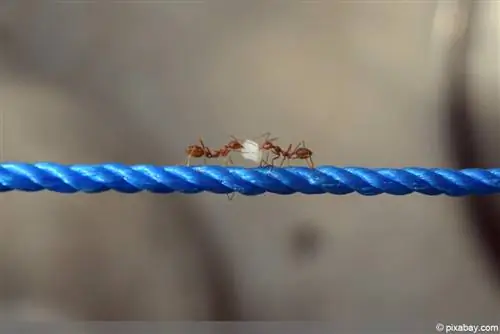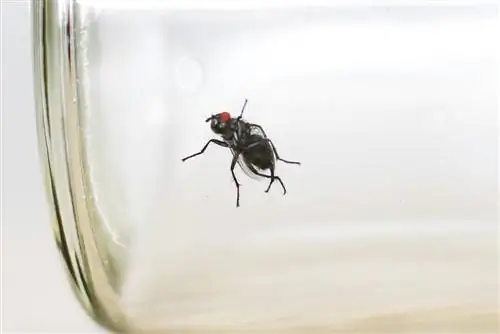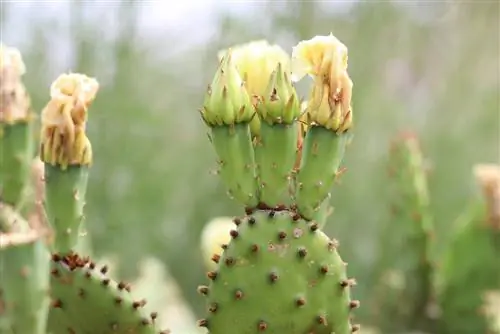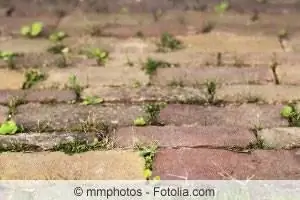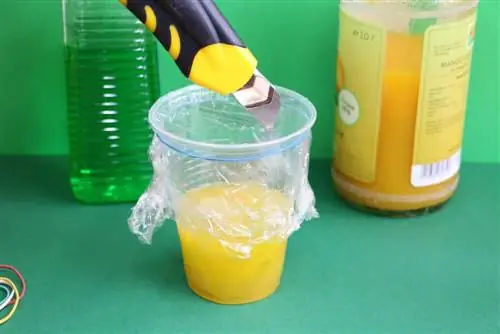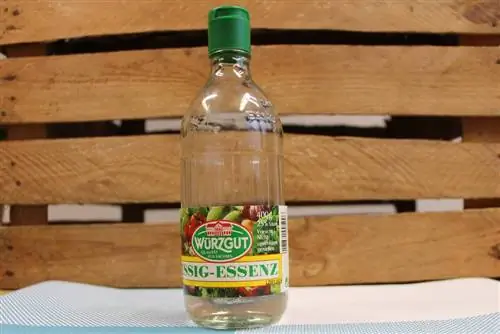- Author admin caroline@plants-knowledge.com.
- Public 2023-12-17 03:39.
- Last modified 2025-01-24 12:45.
Ant baits are available commercially in different shapes and compositions. Alternatively, you can also make appropriate ant bait from home remedies, on the one hand to attract the insects and then move them or simply to keep them away from certain areas or to drive them away from there. There are several species of ants that can be found both in the home and in the garden. The fight is most effective if the queen is also killed, which usually requires a lot of patience and perseverance.
Sweet Ant Bait
These insects can be easily baited with sweetened beer or other sweet liquids. Where ants have been seen, right next to a nest or an ant trail, place a bowl or soup plate at least 1 cm high with stale beer that has been sweetened with plenty of sugar. The side walls of the container should be smooth so that the animals cannot crawl out again. Instead of beer, honey, fruit syrup or regular sugar can also be dissolved in the water. The ants, attracted by the sweetness, crawl into the bowl or liquid, where they eventually drown.
Tip:
These baits are only effective if the nest has been located and the bait placed in close proximity. Otherwise the effect only lasts for a short time and new ants appear.
Strong smells as a repellent
Ants have a sensitive sense of smell and therefore avoid strongly scented substances. You can take advantage of this and, for example, spread vinegar, lemon peel, cinnamon, lavender flowers, cloves, marjoram or chili powder on nests or ant trails. Fragrance oils have the same effect and are used in the same way. You can also put these oils on a small cotton ball and lay it out. It should be watered again about every two days. Since lavender and clove oil have a very strong smell, it is not advisable to use them indoors unless you like strong smells. It is better to plant herbs such as thyme, lavender or rosemary in small pots and distribute them around the apartment. Planting strong-smelling herbs or aromatic plants can also be helpful in the garden, provided they are planted or sown in the immediate vicinity of one or more nests.
Tip:
Vinegar has the disadvantage that it evaporates quickly, especially outdoors, so it has to be used several times, for example. B. must be applied using a spray bottle. The same applies to all other substances with a strong scent; these also have to be renewed after a few days.
Barrier made of chalk or garden lime
- The effectiveness of chalk or garden lime is based on the fact that ants avoid dusty surfaces.
- But that doesn't stop them from avoiding these areas.
- You can use chalk or lime to create a barrier that ants cannot cross.
- You draw a thick line around the entry hole or the nest.
- Or in front of a wall to prevent them from crawling up the walls.
- In front of house entrances so that they cannot get into the house.
- Around a terrace or other object worthy of protection.
Tip:
Due to wind and rain, the effect of a chalk or lime stroke does not last long and would have to be repeated accordingly.
Baking powder, baking yeast and baking soda
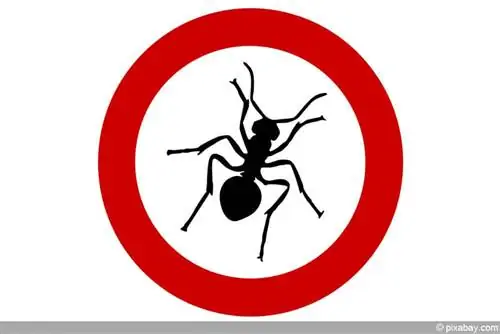
Baking powder and baking yeast are often recommended to combat ants and touted as old home remedies. However, baker's yeast is ineffective for so-called Hymenoptera, which also includes ants. Baking soda mixed with powdered sugar is said to attract and kill ants. Sometimes there is talk of the animals literally bursting or exploding, but this is not the case. Depending on whether it is used indoors or outdoors, the baking soda should be sprinkled near the nest or on ant trails. It is true that the animals die from the baking soda, not because they burst, but because the baking soda changes the pH value in the animals' bodies upon contact. As a rule, however, they avoid dusty surfaces, including baking soda. In addition to baking powder, pure baking soda is often recommended, which is previously mixed with powdered sugar and then used like baking powder.
Tip:
Baking soda only helps if it contains sodium bicarbonate. As a rule, commercial baking powder contains the substance potassium hydrogen carbonate, which is ineffective against ants.
Plant manure and brews
- Manure or plant decoctions are only suitable for outdoor use.
- Wormwood manure, which you can make yourself relatively easily, is said to be particularly effective.
- You put 300 g of fresh or about 30 g of dried wormwood in ten liters of water.
- The whole thing is left covered for about 2 weeks.
- During this time it begins to ferment and becomes a slurry.
- Now the brew must be distributed over the ant burrow or on areas populated by ants.
- A decoction of cloves and water is also said to be helpful.
- You put the cloves in water and leave them for a maximum of two days.
- Then it is spread where you want to drive away the animals.
- The whole thing may have to be repeated a few times.
Tip:
Caution is advised when using manure if the ants are on a lawn or between other plants, as the caustic manure can cause burns.
Copper
Another effective home remedy is supposed to be copper, in the form of copper coins, copper wires or copper sheets. In the house you can place copper coins on existing ant trails or in the immediate vicinity of food sources or kitchen waste. In the garden, copper wires about 10 cm long are more suitable, which are inserted two or three times into the ant nests. Of course you can also use copper coins, as long as you can remember how many of them you have distributed in the garden and, above all, where.
Relocate ant colony
Ants can be relocated to another location instead of killing them. To do this, a flower pot is filled with damp wood shavings, soil, crumpled newspaper or damp straw and vice versa over the ant nest orthe exits of the nest turned over. It then stays there for a few days. During this time, the ant colony and its queen move into the pot. Now you can transport it and the ants to another location by pushing a shovel or spade under the container, carefully lifting it and transporting it to a more convenient location.
Tip:
You should be careful not to place the flower pot and ants too close to the original nest, because ants have different ranges of movement and can find their way back to their old nest at a distance of up to 20 m.
Watch out for aphids
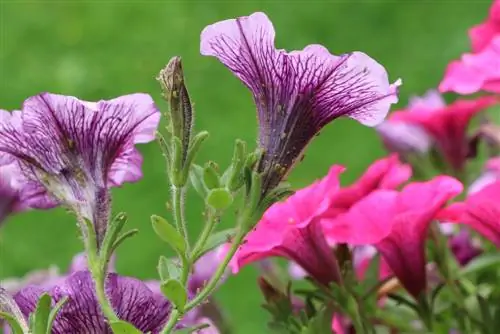
In order to effectively combat ants, you should know that some species maintain a symbiosis with aphids, i.e. H. They feed on the excretions of the lice, the so-called honeydew. In return, they drive away the aphids' natural enemies so that they can spread unhindered. If there are more ants, it could also be because certain plants, including houseplants, are infested with aphids. Then the aphid infestation should first be eliminated.
Conclusion
Ants are very hard-working animals that take on many important tasks in nature. But they can also be perceived as very unpleasant, e.g. B. in a well-kept lawn or when they occur in the house. Then there are numerous more or less effective home remedies that can be used to combat or drive away the problem. If there is an increased occurrence in the house, a professional pest controller should be called in.

